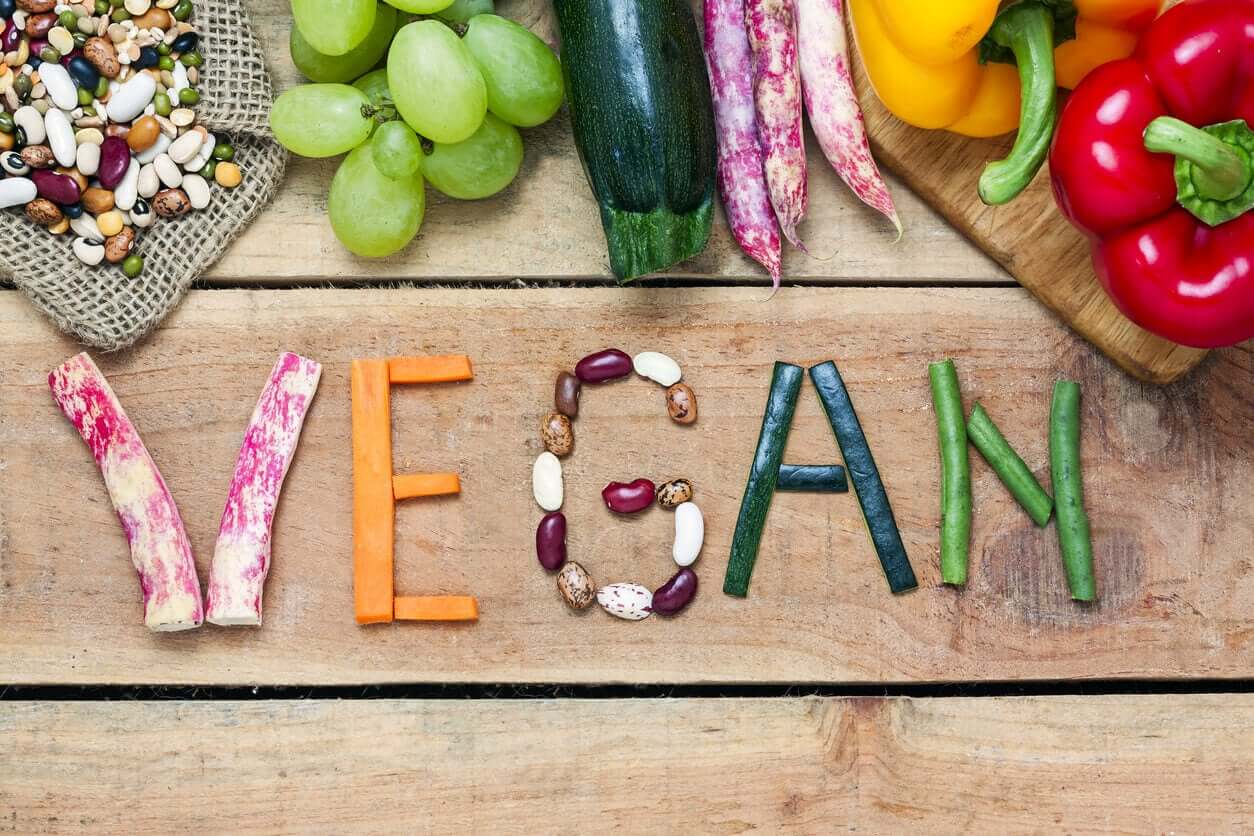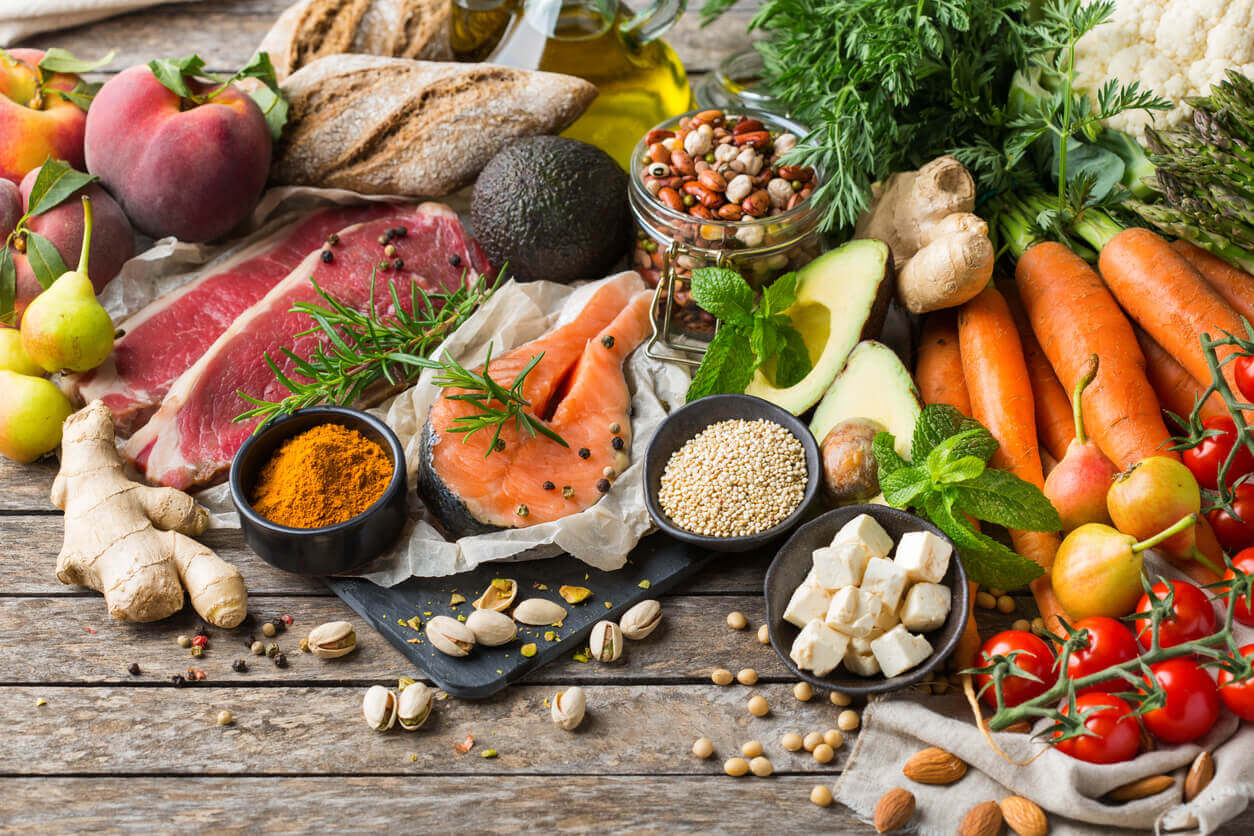Vegan Diet for Babies: What You Should Know

The vegan diet in babies is possible, but experts don’t recommend it. This means that your approach is viable as long as you include a number of supplements. But as such, it’s not a good option when it comes to ensuring the optimal growth of the young child.
One of the principles of healthy eating is variety and, therefore, it’s best to broaden the spectrum of foods as much as possible. Especially during the first stages of life, in which nutritional deficits can seriously condition the state of health.
How to approach a vegan diet for babies?

Despite the fact that most experts don’t recommend it, many parents choose to follow this eating habit. Therefore, professional intervention is crucial in order to follow a vegan diet that’s as nutritionally complete as possible.
Up to 6 months of life, breast milk covers all of a baby’s protein needs. However, from then on, parents need to include foods that contain proteins in the diet, especially when choosing to end breastfeeding.
According to a study published in the Annals of Nutrition & Metabolism, parents must offer a considerable supply of protein during the first stages of life in order for the child to grow and develop properly.
These nutrients are present in meat and animal derivatives (such as dairy), but also in vegetables and cereals. Protein supplements are an alternative when it comes to achieving a sufficient intake when it comes to offering vegetarian (non-omnivorous).
A key aspect when planning a vegan diet for a baby is to ensure a wide variety of plant-based foods. In line with this, it’s important for cereals, grains, legumes, and tubers to appear frequently.
It’s very important for parents to know that this type of diet has to do with an increased risk of low weight in babies, in comparison to those who receive a full (omnivorous) diet. Even so, the results of the studies aren’t entirely conclusive, as a recent review in the Argentine Archives of Pediatrics indicates.
Other nutritional deficits having to do with the vegan diet for babies
Protein intake isn’t the only critical aspect of the vegan diet for babies, as deficiencies in iron, vitamin B12, calcium, and vitamin D can also occur. What’s more, this type of diet can even compromise the intake of zinc. That’s due to the difficulties of including nuts in the diet of the little ones.
Vitamin B12 is usually supplemented by means of pharmacological preparations, as the only source of the nutrient is foods of animal origin. Failure to add it to the diet puts the child is at risk of suffering from megaloblastic anemia in the medium term, as research in the Nestle Nutrition Institute Workshop Series reveals.
When considering a vegan diet for babies, it’s best to carry out some biochemical analyses of the blood in order to know its state of health. Many times, it’s difficult to recognize the symptoms of nutritional deficiencies and, if this condition perpetuates, the child runs the risk of experiencing problems in their health and development.
When low levels of an essential nutrient are detected in the blood, it will be necessary to resort to its supplementation and the reorganization of the dietary pattern. For this reason, it’s crucial to carry out rigorous control to avoid chronic diseases.
Experts discourage the vegan diet for babies

In adults, the vegan diet may offer certain benefits. However, it’s not the appropriate type of diet for a growing child.
Non-omnivorous diets, including vegan diets, aren’t recommended at all in childhood. This is because the potential benefits don’t outweigh the risks, which are far more than people realize.
During the first stages of life, it’s best to bet on a good nutritional education, in which the consumption of fresh food is prioritized over that of industrial ultra-processed foods. Also, postpone the approach of a restrictive diet until adulthood.
The nutritional deficits that occur during childhood seriously condition the future health of the child. For this reason, it’s essential to ensure a sufficient intake of all kinds of nutrients in childhood and adolescence.
The vegan diet in babies is possible, but experts don’t recommend it. This means that your approach is viable as long as you include a number of supplements. But as such, it’s not a good option when it comes to ensuring the optimal growth of the young child.
One of the principles of healthy eating is variety and, therefore, it’s best to broaden the spectrum of foods as much as possible. Especially during the first stages of life, in which nutritional deficits can seriously condition the state of health.
How to approach a vegan diet for babies?

Despite the fact that most experts don’t recommend it, many parents choose to follow this eating habit. Therefore, professional intervention is crucial in order to follow a vegan diet that’s as nutritionally complete as possible.
Up to 6 months of life, breast milk covers all of a baby’s protein needs. However, from then on, parents need to include foods that contain proteins in the diet, especially when choosing to end breastfeeding.
According to a study published in the Annals of Nutrition & Metabolism, parents must offer a considerable supply of protein during the first stages of life in order for the child to grow and develop properly.
These nutrients are present in meat and animal derivatives (such as dairy), but also in vegetables and cereals. Protein supplements are an alternative when it comes to achieving a sufficient intake when it comes to offering vegetarian (non-omnivorous).
A key aspect when planning a vegan diet for a baby is to ensure a wide variety of plant-based foods. In line with this, it’s important for cereals, grains, legumes, and tubers to appear frequently.
It’s very important for parents to know that this type of diet has to do with an increased risk of low weight in babies, in comparison to those who receive a full (omnivorous) diet. Even so, the results of the studies aren’t entirely conclusive, as a recent review in the Argentine Archives of Pediatrics indicates.
Other nutritional deficits having to do with the vegan diet for babies
Protein intake isn’t the only critical aspect of the vegan diet for babies, as deficiencies in iron, vitamin B12, calcium, and vitamin D can also occur. What’s more, this type of diet can even compromise the intake of zinc. That’s due to the difficulties of including nuts in the diet of the little ones.
Vitamin B12 is usually supplemented by means of pharmacological preparations, as the only source of the nutrient is foods of animal origin. Failure to add it to the diet puts the child is at risk of suffering from megaloblastic anemia in the medium term, as research in the Nestle Nutrition Institute Workshop Series reveals.
When considering a vegan diet for babies, it’s best to carry out some biochemical analyses of the blood in order to know its state of health. Many times, it’s difficult to recognize the symptoms of nutritional deficiencies and, if this condition perpetuates, the child runs the risk of experiencing problems in their health and development.
When low levels of an essential nutrient are detected in the blood, it will be necessary to resort to its supplementation and the reorganization of the dietary pattern. For this reason, it’s crucial to carry out rigorous control to avoid chronic diseases.
Experts discourage the vegan diet for babies

In adults, the vegan diet may offer certain benefits. However, it’s not the appropriate type of diet for a growing child.
Non-omnivorous diets, including vegan diets, aren’t recommended at all in childhood. This is because the potential benefits don’t outweigh the risks, which are far more than people realize.
During the first stages of life, it’s best to bet on a good nutritional education, in which the consumption of fresh food is prioritized over that of industrial ultra-processed foods. Also, postpone the approach of a restrictive diet until adulthood.
The nutritional deficits that occur during childhood seriously condition the future health of the child. For this reason, it’s essential to ensure a sufficient intake of all kinds of nutrients in childhood and adolescence.
All cited sources were thoroughly reviewed by our team to ensure their quality, reliability, currency, and validity. The bibliography of this article was considered reliable and of academic or scientific accuracy.
- Richter M, Baerlocher K, Bauer JM, et al & on behalf of the German Nutrition Society (DGE). Revised Reference Values for the Intake of Protein. Annals of nutrition & metabolism 2019;74(3):242–250. Disponible en: https://doi.org/10.1159/000499374
- Müller P. Vegan Diet in Young Children. Nestle Nutrition Institute workshop series 2020;93:103–110. Disponible en: https://doi.org/10.1159/000503348
- Comité Nacional de Crecimiento y Desarrollo. Crecimiento en niños y en hijos de madres que adhieren a dietas vegetarianas: revisión de la literatura. Arch Argent Pediatr 2021;119(4):S77-S106. Disponible en: https://www.sap.org.ar/uploads/archivos/general/files_suple4_crecimiento_25-6pdf_1623186181.pdf
This text is provided for informational purposes only and does not replace consultation with a professional. If in doubt, consult your specialist.








